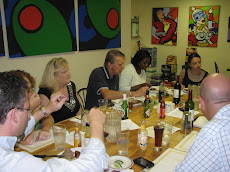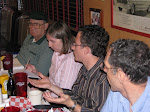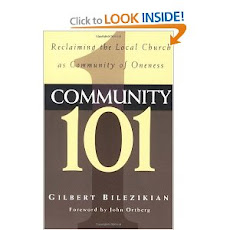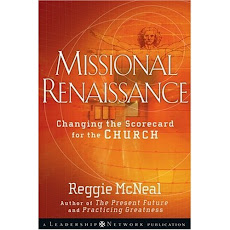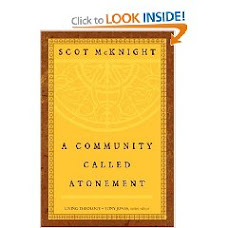 Ten of us met at Laura’s Cuban Restaurant last Tuesday night. Wendy and her husband Tarlton were newcomers, both to this area and to our conversation. We all enjoyed getting to know them.
Ten of us met at Laura’s Cuban Restaurant last Tuesday night. Wendy and her husband Tarlton were newcomers, both to this area and to our conversation. We all enjoyed getting to know them.After a brief re-cap of the article we’ve been discussing, “Five Streams of the Emerging Church.” Steve F. and Flavio shared their “stories” of the spiritual journey that led them to this table tonight. While neither this writer, nor this format, can do justice even to a ten minute summary of a person’s life’s journey, here were some themes:
Steve F. spoke about his “radical” dedication to the cause of Christ since “saying the sinner’s prayer” at a young age – living in community with other young Christians who were recovering from any variety of life’s scars, touring with a Christian rock band, and spending so much time “being all that” for Christ that he missed some of the basics along the way. In fact, he was stopped in his tracks one day when he discovered that one true meaning of the word “radical” was not what he thought. It actually meant “basic…fundamental.” He took a break from all the activity to explore the basic fundamentals of Christianity: to learn to love God and others and to grow to be more like Jesus. Ironically, in doing so, he was criticized by those in his church. Maybe that’s because now he really was being radical according to another definition, “Favoring or effecting fundamental or revolutionary changes in current practices, conditions, or institutions.” Steve shared how he’s “served” the church for many years, but one reason he came to this table is that he simply wants friends. How radical is that?
Flavio grew up as part of a missionary family in Brazil. By the time he got back to the U.S. he discovered that although he was American by passport and heritage, he was “an invisible immigrant” since he didn’t know the ways of American culture. So, you know how kids get treated when they don’t quite fit in. Flavio’s experiences gave him a greater empathy for the marginalized in society, as well as an analytical mind. He’s seen church done all kinds of ways, and can rank them according to a number of attributes: doctrinal purity, worship, community, missional focus, hospitality to strangers and how decisions are made – ownership (with the later becoming more important and the earlier less so as time goes by). The question of how we can participate in and impact the Body of Christ (the “church”) and through it, those around us, is one thing that led Flavio to the emerging conversation. But his continues to be a journey which has not reached a destination. Should we ever feel we’ve “arrived?”
Flavio and Steve both shared of themselves, and we got to know them better. Church is relational. We’ll try to have one person share their story each month.
How we participate in the life of the church led us to the next part of the discussion, about “leaderless organizations.” Flavio and Matt shared some of the principles found in The Starfish and the Spider: The Unstoppable Power of Leaderless Organizations by Ori Brafman and Rod Beckstrom who applied their business know-how to promoting peace and economic development through decentralized networking. In short, “spider” organizations are characterized by top-down hierarchies and communication, centralized knowledge, power and resources, rigidity and clearly defined membership. One major weakness? If you thump it on its head, it will die. By contrast, starfish organizations, like the animals they are named for, can regenerate if one part is cut off. In fact, these are their strengths: Distributed knowledge, power and resources, direct communication (not depending on intermediaries), flexibility, fuzzy boundaries and interchangeable roles based on the participants’ abilities, talents and giftings.
How then do we apply starfish or spider models to the “church?” We just got started on this fascinating topic. It was pointed out that starfish organizations can make decisions by consensus. Participants are then more invested in the decisions of the group, which makes it stronger. Wikipedia is one model here. Common goals are key. What are our goals in the church?
If church can be a decentralized network, how do we deal with “error?” What happens if participants start to embrace downright harmful beliefs and behaviors? Well linked communication is vital. Who are they talking to? Who’s talking to them? And where do we all get our instructions from? Jim pointed out that none of Paul’s epistles were addressed to “church leaders.” Is there really a Holy Spirit “…whom the Father will send in my name, [who] will teach you all things and … remind you of everything I have said to you.”? What is the Holy Spirit saying to you, and to us?
I know many of us are looking forward to continuing the conversation. We’re planning to do so again back at Laura’s on Tuesday night, November 11th.
Steve

